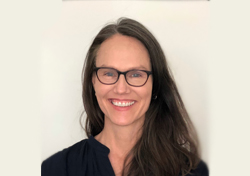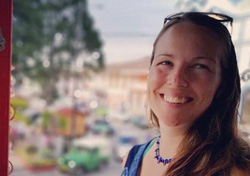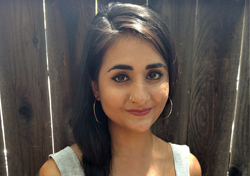Gretchen Le Maistre, Studio Art
- Museum of Southern History
Gretchen LeMaistre is an artist in the MFA Studio Art Program at UC Davis. Through her research and photographic practices, she explores the troubling legacies of American colonial settlement. In 2017, she documented the poaching of Redwood trees located in the State and National Parks, a project collaboration with Kirk Crippens which led to the publication of the book, Live Burls. Her recent work interweaves documentary and performative approaches toward a reckoning with the mythologized narratives of her white ancestral heritage in the American South.
Sarah Hart, Performance Studies
- Affective Facilitation: Applied Theater in Contexts of Displacement and Violence
Sarah Ashford Hart is a socially-engaged performance practitioner, scholar and educator from a Canadian-Venezuelan-American family background. She completed her BA in Theatre at Barnard College, Columbia University, in NYC and her MA in Devised Theatre at Dartington College of Arts, Falmouth University, in England. Her PhD in Performance Studies at UC Davis, with designated emphases in Practice as Research and Human Rights, focuses on facilitating the expression of experiences of mobility and enclosure, specifically among incarcerated, migrant and displaced women and children in California, Chile and Colombia. Her dissertation aims to contribute to applied theatre facilitation practices by re-thinking frames for valuing its ‘impact’ from a hemispheric and decolonial perspective, showing how facilitation can work against dehumanization by centralizing affect and embodiment. During 2019-20 Sarah has conducted fieldwork in Bogotá, Colombia, as a Fulbright US Student Researcher, studying socially-engaged performance initiatives engaging internally displaced people and Venezuelan migrants. Recent publications address contemporary performance in Latin America, devised theatre methodology, the importance of affect to applied theatre in contexts of immigrant incarceration, and her embodied practice of witnessing deportation narratives. Research areas include applied theatre, human rights, performative ethnography, decolonial theory, affect theory, embodiment, migration studies, carceral studies and performance studies.
Zunaira Komal, Cultural Studies
- Psychiatric Life of Azad Kashmir: Healing, Liberation, and Islam
Zunaira Komal is a doctoral student in Anthropology, and a masters student in Cultural Studies, at UC Davis. Her research focuses on transcultural psychiatry’s epistemic entanglements with militarism in the context of Kashmir, as well as how Islamic approaches to faith-based healing and armed resistance provide at times resonant and at times critical engagement with psychiatry’s approach to suffering. She is an Associate Editor for Milestones: Commentary on the Islamic World, and has contributed to Jadaliyya, Feminist Studies, and Contending Modernities. Zunaira is from Pakistan and the Pakistan-controlled part of Kashmir.
Alejandra Cano, Native American Studies
- Embodied Knowledge: the Archive that Conserves Native Honeybees
Alejandra Cano is a PhD student in the Native American Studies Department at UC Davis. Her work focuses on the intersection between Culture, Food Sovereignty, Land Stewardship, and Native Science. Alejandra graduated with honors from UC Berkeley with a B.S. in Conservation and Resource Studies with a focus on Agro-Ecology. Since graduating in 2011, she has applied her skills as part of the Food and Environmental Justice movements in the greater Bay Area as well as abroad. Her dissertation research is in partnership with the Embera de Chigorodó, whose ancestral territory is in present-day Colombia, and aims to articulate embodied knowledge about native honey bees as ecological expertise. Alejandra was born in Colombia and her experiences as a migrant, mestiza woman, and emerging scholar in Native American and Indigenous Studies inform her efforts toward hemispheric unity of the Indigenous people of the Americas. Alejandra is fluent in both Spanish and English and is excited to learn the Embera language.
